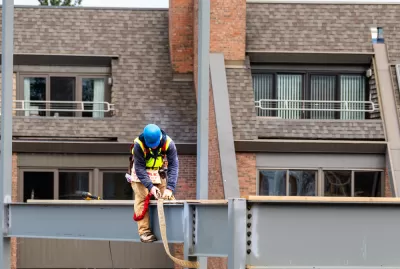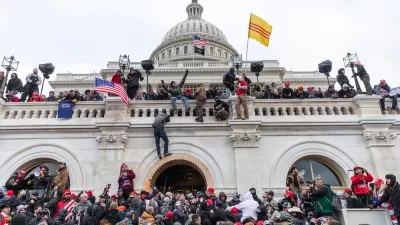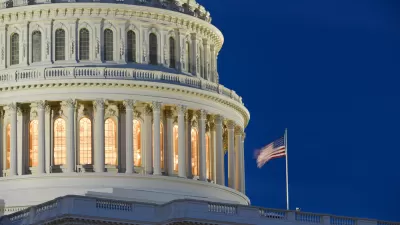The potential of the Infrastructure Investment and Jobs Act is most unrealized as the federal government mobilizes the details of the $1.2 trillion bill. President Joe Biden signed the bill in November 2021.

Writing for Route Fifty, Kery Murakami checks in with the Infrastructure Investment and Jobs Act (IIJA), a year after the historic $1.2 trillion bill was approved by Congress and signed into law by President Joe Biden. On one hand, reports Kurakami, local officials tout the bill’s potential to improve long-neglected infrastructure around the country. On the other hand, “changes are needed to help with the rollout of all the new funding, including speeding up permitting for transportation projects and making it simpler for local governments to apply for the grants,” writes Murakami.
The article digs specifically into some of the specific details of permitting requirements, especially under the National Environmental Policy Act (NEPA). The IIJA made tangible changes to the NEPA process, including a requirement for “federal agencies to consider the ‘indirect’ and ‘cumulative’ environmental effects of projects and not just the direct ones.” Republicans will try to undo those changes, reports Murkami. The IIJA also added the One Federal Decision, “which requires federal agencies to coordinate their environmental reviews.”
Sources cited in the article include U.S. Senator Ben Cardin (D-Maryland); U.S. Senator Kevin Cramer (R-North Dakota); Jim Willox, chairman of the Converse County Commission in Wyoming; Michael Carroll, deputy managing director of the Philadelphia Office of Transportation and Infrastructure Systems; and Jacob Day, mayor of Salisbury, Maryland.
While the article also mentions a few specific programs funded by the IIJA, like Buy America requirements, $5 billion to install electric vehicle charging infrastructure, and the Transportation Alternatives program (doubled by the IIJA), most of details of implementation remain conceptual, and have yet to materialize in tangible, built projects.
FULL STORY: The Infrastructure Law, One Year In

Planetizen Federal Action Tracker
A weekly monitor of how Trump’s orders and actions are impacting planners and planning in America.

Congressman Proposes Bill to Rename DC Metro “Trump Train”
The Make Autorail Great Again Act would withhold federal funding to the system until the Washington Metropolitan Area Transit Authority (WMATA), rebrands as the Washington Metropolitan Authority for Greater Access (WMAGA).

DARTSpace Platform Streamlines Dallas TOD Application Process
The Dallas transit agency hopes a shorter permitting timeline will boost transit-oriented development around rail stations.

Supreme Court Ruling in Pipeline Case Guts Federal Environmental Law
The decision limits the scope of a federal law that mandates extensive environmental impact reviews of energy, infrastructure, and transportation projects.

Texas State Bills to Defund Dallas Transit Die
DART would have seen a 30% service cut, $230M annual losses had the bills survived.

Bikeshare for the Win: Team Pedals to London Cricket Match, Beats Rivals Stuck in Traffic
While their opponents sat in gridlock, England's national cricket team hopped Lime bikes, riding to a 3-0 victory.
Urban Design for Planners 1: Software Tools
This six-course series explores essential urban design concepts using open source software and equips planners with the tools they need to participate fully in the urban design process.
Planning for Universal Design
Learn the tools for implementing Universal Design in planning regulations.
Roanoke Valley-Alleghany Regional Commission
City of Mt Shasta
City of Camden Redevelopment Agency
City of Astoria
Transportation Research & Education Center (TREC) at Portland State University
US High Speed Rail Association
City of Camden Redevelopment Agency
Municipality of Princeton (NJ)





























